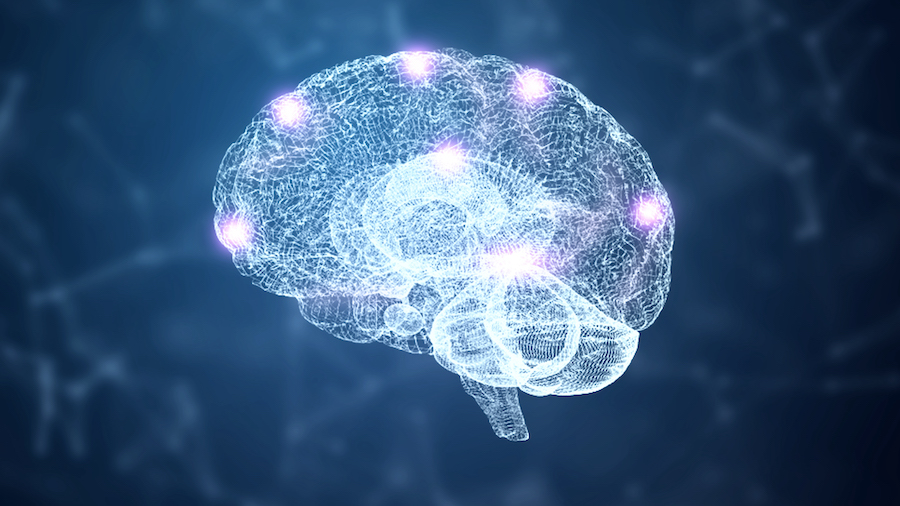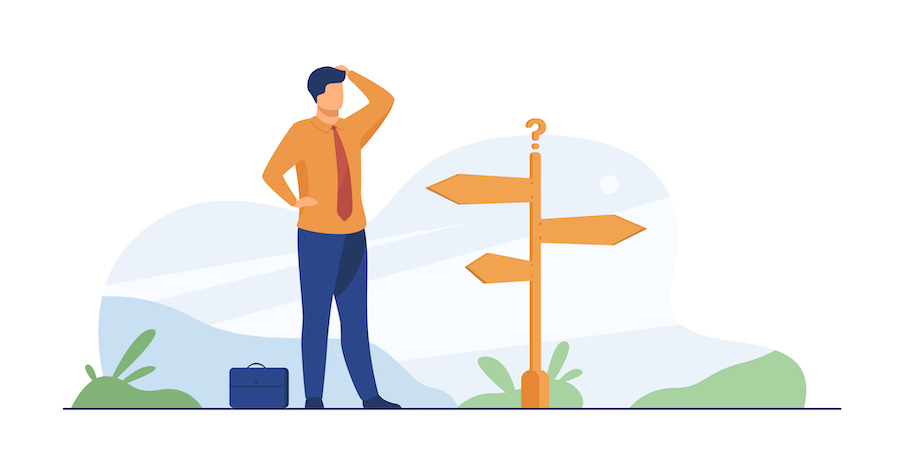How Our Mind Affects Our Decision-Making Process

Decisions, decisions, decisions—from the moment you decide to open your eyes after hearing your alarm in the morning and hitting the snooze button a few times, trying to catch a few more minutes of sleep to brushing your teeth before you go to the bed at night, we make a variety of decisions in a day. There is a massive storage of past experiences and knowledge in our brain that the mind consults to make the most appealing decision at any given moment. An average person supposedly makes over 35,000 remotely conscious choices or decisions per day according to a study done by B. Sahakian and JN Labuzetta, two researchers who examined the processes of normal and abnormal decision-making of humans.
We make a decision when we combine our experiences, beliefs, values, and perceptions in order to choose the best course of action that appears to us in that particular moment of time. This is why you should not be overly critical of your past decisions and behaviors. You made the decisions that felt the best for you at the time, and while you may have taken a different decision given the wisdom you have acquired since then, dwelling on your past decisions and worrying only takes up your valuable mental energy and clouds your judgment in the present to make better decisions with clarity for the future.
Let’s face it, even when exposed to the same experiences, knowledge, and circumstances, some humans make better strategic decisions than others. This is due to the unique intellectual functions that a person is born with due to their genetics, and acquired during their socialization process. It includes your mind’s capacity and capability for reasoning—both abstract and objective—along with your ability to feel, think, imagine, and logically perceive the world around you as discussed earlier in this article. Intellect is a diverse and dynamic ability of the mind on its own. While it is generally about reaching correct conclusions to the problems that the environment poses, there are many different types of intellect that aid our decision-making process in different areas of life.
Here are several types of intellect that help a person’s mind when they make decisions.
- Logical Intelligence: Involves a highly analytical problem-solving ability in making decisions.
- Spatial Intelligence: The ability to think in three dimensions, as opposed to two. Helps in navigational and constructional decision-making.
- Emotional Intelligence: Higher levels of emotional intelligence is imperative to perceive and control emotions of one’s self and of others when making a decision that affects others.
- Linguistic Intelligence: Better communication skills and the ability to understand both verbal and non-verbal cues in making decisions.
- Intrapersonal Intelligence: The awareness of self. The ability to fully comprehend the skills and strengths along with weaknesses of a person, allowing them to make strategic goals and decisions for the future.
- Interpersonal Intelligence: This type of intellect is about having empathy and the ability to understand another person. Helps in mediating conflicts and making sound decisions when working together as a team.
The human mind makes decisions in several steps that are interrelated. It is closely connected to the fundamental mechanisms of how our mind works. It starts by identifying the several courses of action that are available to the decision-maker. The mind uses its inherent properties, such as perception, memory, and reasoning, in order to select the most beneficial course of action when making the final decision. The second step is the identification of the consequences of each course of action one can possibly take. Usually, you go towards the relatively most attractive and the safest course of action, but it can vary depending on the personality traits, values, and intellectual levels of each person.
Making a decision is an extremely personal and subjective process. While you can always predict the chances of a person taking a certain decision, the dynamic nature of the human mind can make them select a different course of action, even at the very last minute. Some people use straightforward and logical reasoning for their decision-making, while some may go for more complex or sophisticated techniques. The most strategic a person is, the more complex the reasoning behind their decision-making. Finally, all things considered, you end up making what appears to be the best option or the best course of action, depending on the circumstance.

The Process of Decision Making
Trying to quantify and create a blueprint for the way every person makes a decision is an almost impossible task since human minds are extremely different from one another. However, when observing the way people make decisions, there are patterns and processes that emerge, which makes it easier to understand how most decisions come to be. This showcases the process for only deliberate and thoughtful decisions, as opposed to impulsive decisions that are recklessly driven by emotion without thinking through. Following this strategic process often leads to satisfying outcomes since it is very rare that an impulsive and emotionally loaded decision turns out to be the better alternative in any given situation.
1.Identification of the Need for a Decision
This is the very first step of making a decision—the realization that you need to make a decision. It may only take a fraction of a second, but it is at this stage you have to have proper clarity and focus about the kind of decision you are about to make. It applies to everything from deciding which topping goes on your pizza, to selecting your college major. The bigger the decision is, the longer the human mind tends to put off this step.
Making a decision is always a stressful process—just imagine how difficult it is for you to decide what to make for dinner or which dish you should order from a restaurant menu. The human mind is wired to avoid prolonged pain and stress at any cost, which was important in the evolutionary process. However, living in a world and an era where we have to make hundreds if not thousands of decisions per day, we have to surpass the resistance of our mind and use willpower to come to this stage. Once you successfully complete this stage of the decision-making process, your mind is quite efficient in taking you through the rest.
2.Collection of Relevant Information
This is perhaps the most active and interesting stage of the decision-making process. Your mind leads you to collect any pertinent information that is both directly and indirectly related to the decision you are about to make. With smartphones always in our hands, this is the stage when you Google things. If you have to decide which movie to watch on Netflix tonight, your next step is to see which movies are trending, and then do a quick Google search on the ratings of those movies. You may even text and ask your movie-savvy friends about recommendations before deciding on one.
There is both physical and mental work involved in this step. For example, even if you may see that a movie has less than favorable ratings, you might decide to watch it because your favorite actor is starring in it. The important thing in this stage is to get as much information as you could, ideally from several different sources.
3.Identification of the Alternative Decisions
Now that your mind is equipped with relevant knowledge and information, you are able to conjure up several alternative decisions from which you will choose the best option according to the circumstances. These alternatives are paths of actions that will often give you different outcomes, or come to the same outcomes through varying levels of difficulties and consequences. While the earlier step needed a lot of facts and information, when it comes to identifying decision alternatives, you can use your creativity and imagination as you please. There are only so many facts and logic you can get.
Your mind has an amazing ability to connect those available facts with your previous information and creative abilities, so you can create innovative strategic decisions. It is one of the many capabilities the human mind has that it does not share with other animals.
4.Evaluation of the Consequences
In this step, your mind is weighing the consequences and evidence related to each of the alternative decisions you came up with. It is simply about using your reasoning skills, previous experiences, and the factual knowledge you have to hypothetically carry out all the alternatives to the end and see which alternative causes the least damage. In order to successfully complete this step, you should have the clarity of the decision you are making that was mentioned in step one. See which alternative manages to resolve the problem or the reason for the decision that you identified in step one.
Evaluation of the consequences is mostly an internal process. There are some decisions that you can actually experiment with before you make the final decision, but many decisions in life need a sharp mind that is able to be critical, analytical, and imaginative enough to internally evaluate decision alternatives and lead you to make a successful and strategic decision.
5.Selection Among the Alternatives
Now that you have evaluated your options and their consequences, the next step your mind takes when it comes to decision-making is choosing one option among those alternatives. Unless your mind is going through a self-sabotaging phase, these steps involve taking the best alternative according to the circumstances that you are in.
That is why you should never look back and regret the decisions you have made in the past. While they may appear not ideal to you with the experience and wisdom of the present, at the time, that was the best decision you could have taken, and that is what your mind did. Blaming yourself or wasting your time regretting your past decision never does you good. What you can do is to always learn your lessons from the mistaken decisions from the past, and make sure you use that experience as a lesson in all of your present and future decisions.
6.Making the Decision
You have selected the best alternative from the lot, and this step involves finally deciding and taking actions according to that decision. It is at this stage when you get up from the bed, make the order, ask out a potential date, and so on and so forth. You are taking a—hopefully positive—action by implementing the alternative that you picked in the previous step.
7.Reviewing Of Consequences
Your mind’s complex process of making a decision does not stop at simply implementing it. There is a review of consequences that immediately follows the action, which is essential to make better decisions later on. As you know, the human mind is ever-evolving and developing to be better. This last step of reviewing is one of the most important steps to help your mind grow and become richer with the ability to reason better. This review includes another flashback to step 1, and it analyzes whether you were able to provide a solution to the problem that you were trying to resolve with your decisions in the beginning. If your decision has not met the need even after the implementation, your mind goes back to the alternative decisions you made and guides you to implement a different decision.

The Cognitive Process of Decision Making
Understanding the cognitive or the more scientific aspect of your mind’s way of decision-making would give you more insight into the way your mind affects your decision-making. When studying the tasks carried by your mind, decision-making is one of the most basic cognitive processes that it is capable of doing. It involves your brain, and at its core, it is all about imagining several courses of action to give a solution to a problem and selecting the best option among them.
Your brain and the mind have an almost seamless process of decision making as discussed above. Interestingly, humans are not the only animals who make decisions. While humans make the most innovative and complex decisions, animals also go through a somewhat similar process in deciding things that help their survival.
At the most biological level, the first step in making a decision involves getting information through our sensory organs such as sight from our eyes, hearing from our ears, smell from our nose, taste from our tongue, and touch from our skin. These organs receive raw stimuli from the environment we live in, and they signal our nervous system and the brain so we can make decisions depending on the circumstances we are in. Our brain cells, along with the more complex entity that is our mind work almost as a “jury” to take all the evidence into consideration and make a final decision in everything we do.
Different Types of Decisions Made by Our Mind
There are several different types of decisions our minds tend to make depending on the cognitive styles. Here are a few of them to get a deeper understanding of the way the mind affects the decision-making process.
Intuitive Decisions
These decisions are often led by the automatic intuitive system of the human mind. It involves previous experiences, skills, and what is called the “gut instinct” of a person.
Rational Decisions
These decisions are purely based on reason and/or logic. They consider a vast scope of available information and provide the decision with the most beneficial outcome for all parties involved.
Positional Decisions
This mainly refers to taking analytical decisions in a game similar to chess. Positional decisions have a set goal in mind. It involves the formation of linkages between the step right now, and the final outcome at every step of the way.
Combinatorial Decisions
This is another decision-making style that is often connected with chess, which is one of the most advanced games that measures the ability to make the right decisions by a player. Combinatorial decisions also link the present positions with a final outcome, but they are more focused, defined, and have a narrow scope.
Optimal Decisions
This decision style is common among perfectionists and “Type A” personalities. They take all the available information combined with the high informational processing ability of the brain and take decisions that are near perfect or optimal. It takes a long time, energy, and effort to make these types of decisions. While these decisions often give the best outcomes, perfectionist people tend to worry more than others when it comes to making decisions, no matter how good the outcome is.
Sacrificing Decisions
These are called “good enough” decisions. They simply consider the information and find a solution that is just good enough to solve the problem or postpone it as much as possible, so there is no need to deal with it right away. These decisions do not take long. Interestingly, people who make sacrificing decisions are often happy and free of worry even if their decisions do not go the way they initially intended.
Myers-Briggs Type Indicator
This is a personality inventory that takes the different decision-making styles of people into consideration. Isabel Briggs Myers combined this indicator, inspired by the theories of the psychoanalyst Carl Jung. It takes several terminals points that are contrastive to each other to determine the different decision styles of virtually any person. Some of the dimensions considered in this personality and decision-making indicator are thinking and feeling, sensing and intuition, extroversion and introversion, and more.

How Can the Human Mind Effectively Make Decisions
As you probably know from your experience living on this earth as a human, not all decisions we make are effective. From the time we are cognitively strong enough to make an informed decision to the time we take our last breath, we make millions of ineffective decisions. It is just a part of our lifelong learning as a human. We make bad decisions, we make mistakes, we learn, and then we grow. That is the natural way of things for all living things. Since many of us make more ineffective decisions rather than effective ones, it would be more efficient for us to look at the way we can avoid making bad decisions, rather than looking at the ways we can make good ones.
1.Avoid Making Decisions When There Is Not Enough Information
A good decision requires a sufficient amount of information. That is when you can properly analyze the situation and make the best possible decision for that particular scenario. When you make decisions without information, your mind simply cannot reason properly, so the decision has no place to stand. Ideally, you should be able to clearly reason every single decision that you take, especially the major ones that affect your own and other’s lives. Before you make any decision, help your mind by gathering as much data as needed. Even if the decision-making is time-sensitive, an informed decision made at the last minute is always better than a leisurely made uninformed decision.
2.Avoid Making Decisions When the Information Is Too Conflicting and Overwhelming
While this may sound contradictory to the previous point, having too much information can also be an issue when it comes to making good decisions. If your bulk of the information is complementary to each other, by all means, go ahead and make a good decision. However, when you have conflicting information that leaves you skeptical, you need to dig deeper and seek which information provides the most accuracy and value from all the information you have. If possible, delegate the work of analyzing information without overwhelming yourself and stressing out your mind.
3.Avoid Making Decisions Trying to Please Everyone
You can never make a good decision easily if you have an inherent need to please everybody. There will always be someone who does not like what you decide. Have some confidence in your mind’s ability to make decisions on what is the best for you and your life. While it is perfectly good to listen to other opinions in the information gather and evaluation stage, the final decision about anything that is important to you should be done by yourself. Do not get groups of people, even if they are your closest friends, to make final decisions about your life.
4.Avoid Making Decisions When the Stakeholders Have Vested Interests
A vested interest means a personal reason for doing something. More complex decisions in life often come with multiple stakeholders that influence your decision. When it comes to these types of situations, always avoid making decisions when there are people with vested interests influencing your way of thinking when making the decision. Vested interests can weigh down a decision, and can also be manipulative at times. Always do your research about the stakeholders and how your decision may affect them when you are involving stakeholders when making major decisions.
5.Avoid Decisions With Too Much or Too Little Emotional Attachment
When you have an emotional attachment to a possible decision, there are things like the fear of change that can hold you back. For example, you may avoid leaving your hometown for better opportunities because you do not want to leave the house you grew up in. That attachment can truly hinder your growth and success. On the other hand, having zero emotional attachment can also be damaging when it comes to decision-making. In that case, try to connect with someone who genuinely cares about the decision you are making, and have them give you feedback about the decision you are ultimately going to make.
Our mind is a beautiful mosaic of numerous properties, and it adds a vibrant and humane edge to every single decision we make. This is why our decisions are not always the most logical and strategic course of action at any given time. It is our mind that infuses emotion, feeling, and thought into our decisions. It wades through all our memories and experiences to reason our actions. The mind’s ability to imagine beyond the physical limitations further adds interest and excitement to our decision, often making them more innovative and powerful than the most logical course of action. It is the complexity and creativity of our mind that helps make our decisions innovative, varied, and unique—which can be flawed sometimes, but inherently and beautifully human.
References
Fandel, G., & Gal, T. (Eds.). (2012). Multiple criteria decision making: Proceedings of the twelfth international conference Hagen (Germany) (1997th ed.). Berlin, Germany: Springer. Kutty, A. D., Kumar Shee, H., & Pathak, R. D. (2017, May 4). Decision-making: too much info! doi:10.4225/03/590A8A02D63C0 Mind over mind? Decision fatigue saps willpower — if we let it. (n.d.). Time. https://healthland.time.com/2011/08/23/mind-over-mind-decision-fatigue-may-deplete-our-willpower-but-only-if-we-let-it/ The University of Massachusetts Dartmouth. (n.d.). Decision-making process. Retrieved July 19, 2021, from Umassd.edu website: https://www.umassd.edu/fycm/decision-making/process/ Wang, Y., & Ruhe, G. (2007). The cognitive process of decision making. International Journal of Cognitive Informatics and Natural Intelligence, 1(2), 73–85.
